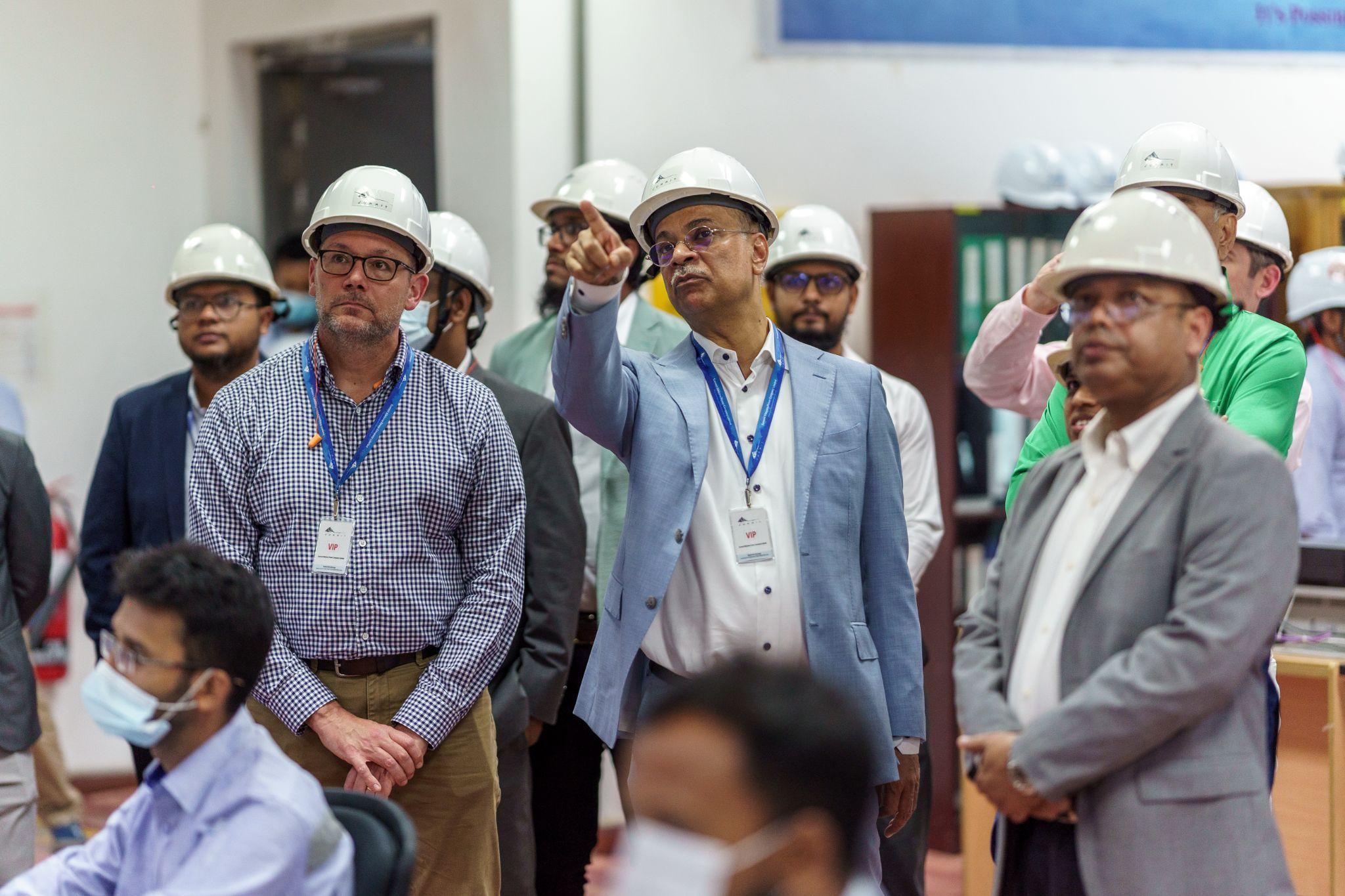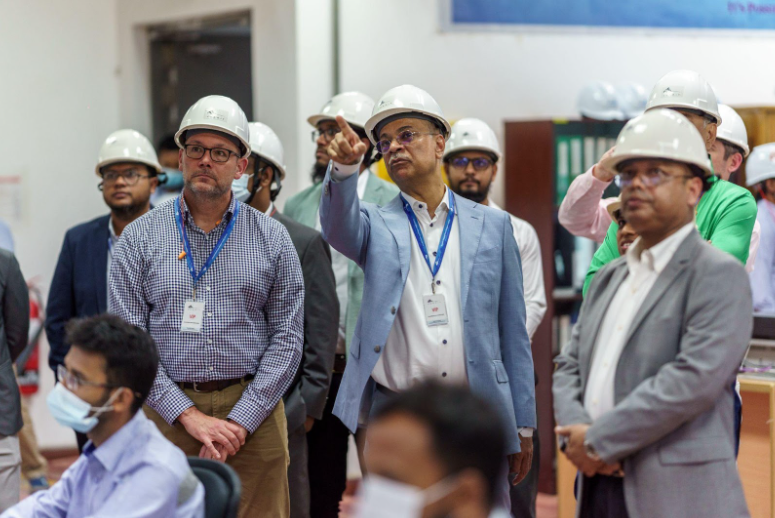Summit Group’s Sustainability Targets: A Roadmap To Net Zero by 2050

Meta: Summit Group’s sustainability strategy balances clean energy goals with economic realities in developing Bangladesh.
Summit Group, Bangladesh’s largest infrastructure provider, has established a comprehensive sustainability plan with ambitious targets in one of the world’s most climate-vulnerable countries. In 2023, Summit’s board approved a sustainability strategy that set clear objectives across multiple timeframes, balancing environmental responsibility with the economic realities of Bangladesh.
“We need to harness artificial intelligence to contain emissions and to bring about re-nurturing Mother Earth so that each and every aspect of Mother Earth, from its soil to its environment, improves,” says Muhammed Aziz Khan, founder and chairman of Summit Group. “It’s very intriguing and it is very challenging, but it is a must.”
Summit Power International, the Singapore-based arm that manages Summit’s power generation assets, is leading this sustainability push with targets that align with global climate goals while recognizing Bangladesh’s unique challenges as a developing nation with limited land availability.
Three-Tiered Environmental Action Plan
Summit’s sustainability approach comprises three distinct timeframes with increasingly ambitious targets:
In the short term, the firm has targeted Scope 1 and Scope 2 emissions reductions of 10% by 2030 as compared to a 2021 baseline. It also plans to procure 100 megawatts of renewable generation assets by 2030.
By 2040, Summit Group has pledged to make 40% of the company’s portfolio from clean energy sources. This target aligns with Bangladesh’s national goal, announced at COP26, of achieving up to 40% clean energy use in its power generation mix by 2041.
And by 2050, the company has set out to achieve net-zero CO2 emissions, matching the target of its partner firm JERA, which owns a 22% stake in Summit Power International.
Wu Yan Bin, chief financial officer at SPI, explains that this comes with practical considerations: “These targets come with various caveats, for example, that the maturation of various technologies such as energy storage systems, nuclear power, green hydrogen, by these timeframes to cost effective levels that are considered affordable for Bangladesh.”
Summit Group’s sustainability strategy has gained significant momentum since the company partnered with Japanese utility JERA, which acquired a 22% stake in Summit Power International for $330 million in 2019.
This partnership has been instrumental in advancing Summit’s clean energy ambitions, particularly after the companies signed a Memorandum of Understanding in April 2022 to develop a comprehensive Carbon Neutral Roadmap. The roadmap includes establishing specific zero emissions targets, identifying pathways to achieve these targets, and exploring opportunities to deploy greener fuels such as hydrogen and ammonia, aligning Summit’s corporate goals with Bangladesh’s national commitments under the Paris Agreement.
Climate Action Plan and Implementation
Summit Group has also committed to a comprehensive climate action plan that includes several concrete measures. The company has committed not to develop new oil-fired power plants in Bangladesh, focusing instead on cleaner alternatives. Muhammed Aziz Khan emphasizes a shift from oil-based power generation to natural gas.
“Our first power projects were oil-based, but we’ve moved on to be natural gas-based, which has less carbon dioxide emissions,” he says.
The company plans to work with international partners and lenders to bring in investments for clean energy projects. This includes the development of cross-border renewable energy solutions from India, Nepal, and Bhutan.
Finally, Summit Group’s newest power plants are already equipped with technology that can accommodate future transitions to cleaner fuels, says Yan Bin. For example, their GE H-class turbine installed at the 590 megawatt Meghnaghat II Combined Cycle Gas Turbine plant is configured to burn a mix of natural gas and hydrogen when hydrogen becomes economically viable.
Addressing Climate Vulnerability in Bangladesh
Bangladesh’s electricity mix remains heavily dependent on fossil fuels, with gas and coal contributing approximately 44% and 28% respectively, while clean energy accounts for merely 2% of the total electricity consumption. This stark reality has reinforced Summit Group’s commitment to expanding its renewable energy portfolio through cross-border projects.
A key aspect of Summit’s sustainability strategy is maintaining affordability while transitioning to cleaner energy. Bangladesh, with its developing economy and large population, requires cost-effective energy solutions.
“It has to make economic sense. When renewables cost less than fossil fuel-based electricity, then people will switch to renewables,” says Ayesha Khan, managing director and CEO of Summit Power International. “Bangladesh is a developing but still a relatively poor country, making it a very cost-sensitive economy.”
Summit’s sustainability strategy is particularly critical given Bangladesh’s extreme vulnerability to climate change impacts. The country already experiences increased frequency and intensity of natural disasters, including devastating floods and cyclones.
Before the UN Climate Change Conference in 2024, Summit Group released a statement calling for world leaders to recognize the disproportionate impact of greenhouse gases on countries like Bangladesh that have contributed relatively little to global warming compared to industrialized nations.
In that statement, Muhammed Aziz Khan asked international organizations, governments, and corporations to provide funding and technical assistance in supporting Bangladesh’s energy transition, including development finance and foreign direct investment. He noted that “different regions will have different timelines to progress towards net zero,” and that Bangladesh’s power sector is focused on reducing reliance on coal or heavy fuel oil while increasing the use of natural gas as an interim solution.
“As a member of the Climate Vulnerability Forum (CVF), Bangladesh has the ambition to supply 40% of its energy needs from renewable sources by 2041,” said Ayesha Khan. “In line with this, Summit, along with our partner JERA, are aspiring to implement the best practices and adaptation knowledge to reach our zero emissions targets.”




























